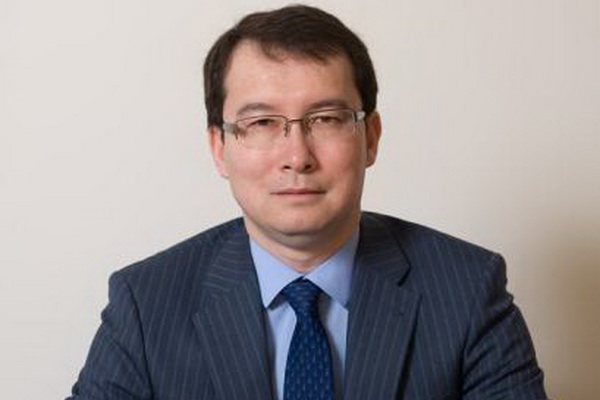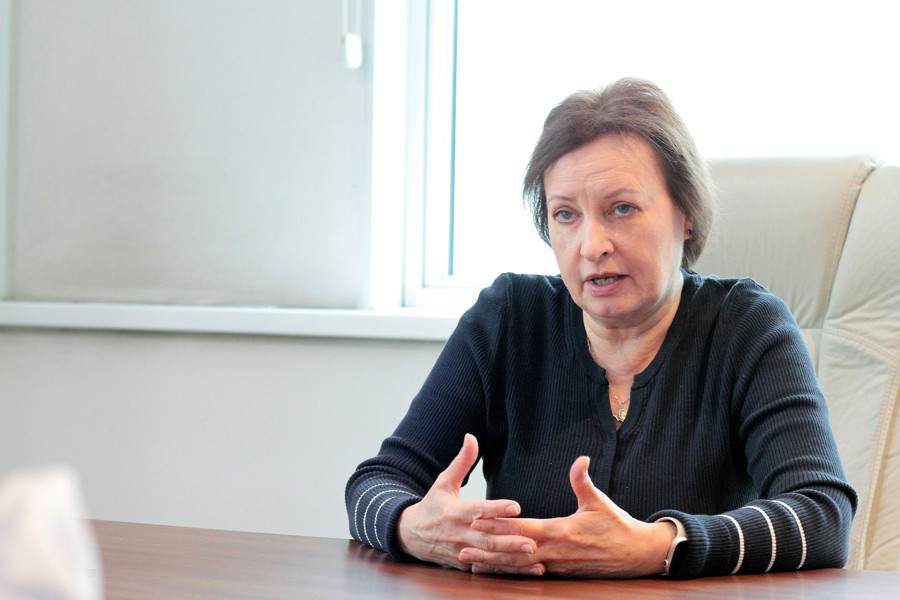EEC Minister of Economy and Financial Policy Timur ZHAKSYLYKOV:
EEC CONSTRUCTIVELY SOLVES ISSUES OF REMOVING PROTECTIONISM IN THE EAEU COUNTRIES

Over a short period of the existence of the Eurasian Economic Union (EAEU), there have been cases when entrepreneurs of this or that EAEU member state have complained about protectionist, sometimes, not quite legitimate measures by one of the [member] states aimed at supporting local businesses. Timur ZHAKSYLYKOV, panel member (minister) of the EEC (Eurasian Economic Commission) for economy and financial policy told Interfax-Kazakhstan on how such situations are being solved.
- Timur Mekeshevich, EAEU has been functioning for 2.5 years, this is a short period, and for the time being it is still difficult to talk about any significant results. How do you assess the achievements in the field of entrepreneurship? What changes are you observing? Have the conditions for businessmen changed?
- The EAEU agreement has laid down a number of important parameters that protect it from the deterioration of conditions for doing business and are aimed at easing gradually [terms and conditions] on all parameters: reducing the burden of permits and procedures, simplifying administration, introducing the one-stop shop principles in the relationship between the state and businesses and so on.
The implementation of legal norms of the Eurasian Economic Union promotes more active interaction of the business structures of our countries, improvements to the entrepreneurs' activity.
As for specific markets. We have two big global markets within the union - goods and services. On the services we agreed that there are 43 service sectors - nearly 50% of all services rendered in EAEU have been within the common market since January 1, 2015. Another 20 service sectors - this is approximately 10% - will also pass onto the common market from 2019 to 2022. These rules are valid for the four countries of the union, the deadline for Kazakhstan is extended until 2025.
The state of the common market assumes that restrictive measures are not applied, the national regime is applied to entrepreneurs from the other partner countries when delivering services. In addition, there is the automatic recognition of permits, such as licenses, certificates.
Another important norm is the delivery of services across the union without re-establishing a legal entity. That is, if you have registered a business or become an individual entrepreneur in one member state, you can work in the other four countries without re-establishing any structure there.
We also agreed on the recognition of the qualification requirements of employees at enterprises and organizations. This is also a very important achievement.
To date, the obligations undertaken by the parties under the agreement are strictly observed.
Speaking about the freedom of movement of goods a great deal of work has been done here, even more than on the services. Since lifting the customs border, a lot of administrative barriers have gone and, of course, this led to a rapid increase in trade. This was especially noticeable in 2012-2013, when trade grew at a tempo of 30-40% per year. Then there was a natural slowdown, when the potential created by the opening of the borders was exhausted, later the other factors associated with the market decline emerged.
But we have intensive cross-border trade ongoing, which is not always recorded by the statistical agencies, since there is no registration of declarations. And this trade account for a significant volume.
What are the tasks that we have set ourselves now? We see the very large potential in application of paperless technologies, the one-stop shop principle. Much is relating to the adoption of the Customs Code. It mainly regulates trade with third countries, it is very important because our common customs regulation is unified.
The new Customs Code is revolutionary enough. It focuses on the use of paperless electronic technologies and online services. Many procedures have been very much facilitated, misinterpretations have been removed, the consensus has been reached how to make these procedures easier for entrepreneurs. It should be noted that businesses took a very active part in the preparation of this document. The focus is made on the use of post-customs controls when the goods are released into internal circulation, and the control procedures are carried out post factum.
It is also important that all parties implement a tool such as regulatory impact assessment. This is a meaningful procedure stipulating the comprehensive evaluation of any regulation that affects entrepreneurship given the onerousness degree for businesses. In fact, all the countries have introduced it. We have also introduced this procedure on the commission and we see that this is a very effective tool, and businesses like it. Entrepreneurs actively use it, get across their position to the EEC and have the opportunity to familiarize themselves with all projects to give their assessment and influence in order for the measure to be as less burdensome for business as possible.
- It is understandable that despite all the agreement clauses each country tries to protect its businesses by creating conditions for attracting new taxpayers. Sometimes measures are taken that are not contradicting the agreement terms de jure but are protectionist de facto. How are conflicts resolved in such cases?
- We live in the real world. It is understandable that the agreement prohibits such measures, but it can not cover all aspects, and still there are some loopholes that the parties use.
How do we work on this? There are illegal protectionist measures called barriers. They are subject to immediate elimination. As a rule, the countries, in case such situations are revealed, do not dispute the decisions of the commission on removing such barriers. We find a constructive solution, prepare an action plan, to which the states agree and commit themselves to removing such barriers.
- What is the time gap between that time when the parties pledge to remove the barriers and when they really remove them?
- Part of the barriers is removed immediately, part - with a small delay. But so far we have yet had no reason to appeal to the EAEU court.
In addition to the barriers, there are other obstacles that are either withdrawals from the free movement of goods or services, or restrictions caused by the absence of legal regulation of the economic relations, the development of which is set out in the EAEU laws.
All this is under constant monitoring of the commission. The so-called "white paper" has been compiled. It is posted on the commission's website, and 60 obstacles agreed by all the member countries existing in the Union's domestic markets are set out therein: of them 17 are withdrawals, 34 are restrictions, and the remaining 9 are barriers. The EEC Council decided to consider issues related to the reconciliation of obstacles in the register at each meeting, as a result of which their list will be regularly updated. Removal of obstacles in the trade and economic cooperation of the EAEU member states will be carried out through appropriate "road maps".
The first "road map" is to be submitted to the Eurasian Intergovernmental Council already this summer.
I would like to say that this problem with restrictions, withdrawals, barriers in the domestic market is very important, it is being actively discussed by business circles, but is not global or critical. The list of obstacles to free movement of goods is known, clearly delineated, we know how to remove them, and all the parties are actively working on it.
- Are there statistics on the flow of taxpayers from one country to another, related to the fact that one of the EAEU countries has created more favorable conditions for business?
- We do not have data on the jurisdiction change, we do not carry out such statistics, and, probably, none of the countries is ready to answer this question. It is impossible to say that some state has strongly advanced in creating conditions for business.
There are indirect data related to the inflow of investments. If the country is large and the market is appropriate, then it pursues a more active investment policy. Thus, according to the data of the Eurasian Development Bank, Russian investors carried out 81.5% of bilateral direct foreign investments in the EAEU countries. Kazakhstan is in 2nd second place (17.4% of exported direct foreign investments), Belarus, Armenia and Kyrgyzstan are quite inferior to the EAEU major economies.
- In your opinion, which country's businessmen proved to be the most prepared for competition?
- I am not prepared to undertake the business assessment of this or that country. I would like to say that, maybe, what hinders Kazakhstani entrepreneurs in the markets of the partner countries. The very important factor is the staff's readiness to work in foreign markets. This always sets higher qualification requirements than when working at home. This is about mental limitations, the knowledge of the host country's legislation, readiness for entrepreneurial flexibility. One must work hard to improve the knowledge and competence.
Another obvious restriction is that there are very large enterprises in Kazakhstan, mainly with commodity orientation, successfully operating in foreign markets. Mainly small enterprises operate in the sphere of export of processed and finished products, which have objective problems in foreign markets due to their size. Imagine what it means to enter and successfully gain a foothold in the foreign market? It is necessary to solve a lot of problems - to have warehouses, to ensure supplies regularity, to know the local legislation, to hire local specialists and many other things. Due to their size it's much more difficult for small enterprises to do. Small businesses are still more orientated towards the domestic market. Therefore, in order to successfully gain ground in foreign markets, it is necessary to seek to enlarge enterprises. There should be an active segment of medium-sized businesses.
- Call the strong points of Kazakhstan's entrepreneurs?
- Kazakhstan's entrepreneurs have always been strong being very mobile, ready for quick concentration of resources in one direction or another. They quickly learn, tap new market, master technology, sales.
Of course, the favorable business environment created in Kazakhstan help them. It should be noted that if one compares all the EAEU countries, the most powerful institutions of state business support are available in Kazakhstan. We see the government listen to the opinion of the business community. State industrial programs are actively implemented in the republic, opportunities for creating additional jobs are being expanded, measures are being taken to reduce the tax and regulatory burden on businesses.
The government of the country takes concrete measures to create a favorable investment climate, and objectives on how to move to a new model of economic growth are being solved. The fulfillment of these aspects will undoubtedly become a powerful impetus for Kazakhstan's business development.
- Thank you for the interview!
July, 2017
© 2026 Interfax-Kazakhstan news agency
Copying and use of these materials without reference to the source is prohibited
Archive





